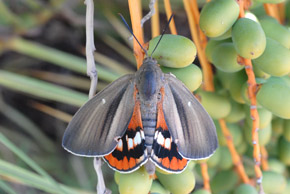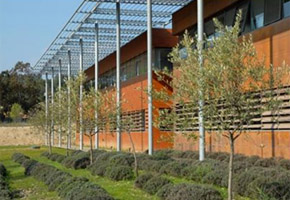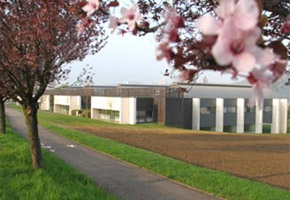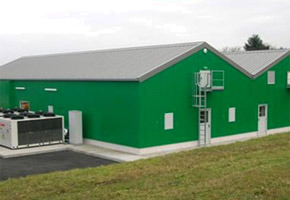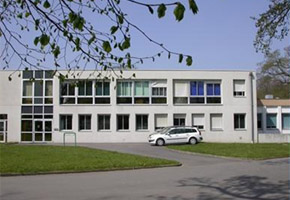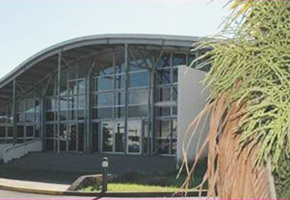M













The Plant Health Laboratory
V. Molinéro-Demilly, F. Poliakoff, P. Reynaud, G. Anthoine, R. Ioos, J-E. Gerbault, J-C. Streito, B. Hostachy, N. Franquet, Anses, Plant Health Laboratory (France)
V. Molinéro-Demilly, F. Poliakoff, P. Reynaud, G. Anthoine, R. Ioos, J-E. Gerbault, J-C. Streito, B. Hostachy, N. Franquet (2012). The Plant Health Laboratory, EuroReference, No. 6, ER06-12F01.
http://www.ansespro.fr/euroreference/numero6/PN40I0.htm
The French National Laboratory for Plant Protection (LNPV) was incorporated into ANSES on 1 January 2011 and is now known as the Plant Health Laboratory. Bringing it under the control of an independent Agency was the logical outcome of national consultations on the health sector which requested that plant risk assessment and management be kept separate. The LNPV, previously a laboratory under the Ministry of Agriculture's Directorate General for Food, had been responsible for expert assessment of organisms harmful to plant health.
The Plant Health Laboratory now provides ANSES's supervisory authorities with scientific and technical support for the monitoring and control of quarantine plant pests. It has 80 members of staff on 6 sites around France. Its administrative offices are in Angers, on the campus of Vegepolys, internationally-recognised as a centre for research, development and higher education in plant sciences.
It has two main missions, to conduct expert appraisals and risk assessment in the field of plant health; and to develop, validate and disseminate methods for identifying organisms officially recognised as harmful (1), genetically modified organisms and invasive plant species.
These two missions are handled by two cross-cutting units: the Expert Assessment of Biological Risks (ERB) Unit and the Analysis and Methods Development (DMA) Unit, which organise the appraisals and analyses carried out by six specialised units.
The five units located in Angers, Montpellier, Nancy, Rennes and Saint Pierre (Reunion Island), cover respectively bacteriology, virology and GMOs; entomology and invasive plant species; mycology; nematology; and tropical pests and pathogens. The station in Clermont-Ferrand contributes to these activities but is mainly involved in quarantining plants introduced under import regulation waivers.
Angers hosts the Reference Laboratory for bacteriology, virology and GMOs. It also houses the laboratory management and the two cross-cutting units: in 2009, the station increased the surface area of its laboratories and created a 3P (biosafety level 3)-level containment facility. It welcomes foreign delegations and organises training courses.
Montpellier is the site of the Reference Laboratory for entomology and invasive plant species. Since 2010, the station has been located on the premises of the Centre for Biology and Management of Populations surrounded by other scientific organisations (INRA, CIRAD and IRD), allowing it to benefit from exceptional collections of insects and library resources.
Nancy hosts the Reference Laboratory for mycology. Its remit includes all pathogenic fungi and oomycota affecting cultivated plants and forestry species.
Clermont Ferrand hosts the quarantine unit for plants brought into Europe via France. It recently obtained ultra-modern biosafety level 3 containment facilities. The unit can now safely perform a wide array of studies and analyses of propagative plant material brought into the EU under waiver of general plant health regulations.
Rennes hosts the Reference Laboratory for nematology (plant parasites). It concentrates particularly on the genera Globodera, Meloidogyne, Ditylenchus and Bursaphelenchus. In its field of competence, the Unit has been ISO 17025 accredited since 2002.
The Reunion Island site was opened in July 2007 further to the establishment of the 3P or Pôle de Protection des Plantes centre, which brings together the Laboratory for Plant Health, CIRAD Réunion, various development services (FDGDON [Departmental Federation of Defence Groups against Harmful Organisms], FARRE [Forum for Integrated Agriculture and Environmental Protection], etc.) and State services, all on the same site. The Reunion Island site includes the Tropical Pests and Pathogens Unit, which works on regulated and emerging organisms.
The Plant Health Laboratory has been accredited and recognised as a “National Reference Laboratory” (by Ministerial Order of 19 October 2011). As such, it runs the network of approved laboratories in its field of competence. It participates in European and international working groups and in joint research projects with INRA, CIRAD and French and other universities and leading colleges. It is frequently asked by the Ministry of Agriculture’s Directorate General for Food to issue opinions on the risk presented by a particular pest (arthropod, nematode, etc.) or plant pathogen and it carries out expert appraisals on various issues in the field of plant health.
The reform of the LNPV in 2007 led to its joining ANSES in 2011
In 2007, the French National Laboratory for Plant Protection was reorganised and since the end of 2010 its operations have taken place in six specialised units. The Clermont-Ferrand site became the only French station with the facilities for quarantine activities, an essential requirement for verifying the safety of plant material imported under waiver.
The Plant Health Laboratory now therefore focuses on biological risk. The analysis of plant health risk is a valuable tool for risk management and for international negotiations. This activity is divided up between the cross-cutting unit for Expert Assessment of Biological Risks and the specialised units at the six stations. The Laboratory also carries out expert appraisal of plant health risk assessment originating in the European Union or other countries.
Since 2007, the Plant Health Laboratory has also concentrated on developing and disseminating methods for regulatory analyses requested by the inspectors of the Regional Food Services of the Ministry of Agriculture and assists private or public approved laboratories involved in performing such regulatory analyses.
The challenges of monitoring and controlling organisms harmful to plant health
The work of the Plant Health Laboratory is influenced by:
- the challenge of the increasing globalisation and volume of trade,
- the variety of plant products, increasingly exotic products and the ensuing unsuspected risks,
- the export of French plant products to other countries with ever-stricter requirements,
- the challenges set by the Grenelle Environment Round Table four years ago, particularly to update agricultural practices in the field of plant protection with the application of the Ecophyto 2018 plan, whose goal is to propose the reduction of plant health treatments between 2008 and 2018, if possible by 50%,
- the growing demands of consumers in terms of food safety.
These changes increase the propagation risk of harmful organisms. It is ANSES’s mission to anticipate these risks in order to improve control measures.
(1) An organism harmful to plants is a species, strain or biotype of a plant, animal or pathogen that is harmful to plants or plant products. The type of harm may be financial (loss of yield, reduced quality, etc.), environmental (impact on biodiversity or ecosystems, etc.) or social (loss of jobs, impact on tourism, etc.).
Focus on a laboratory
Plant Health Laboratory - Angers
Plant Health Laboratory - Montpellier
Plant Health Laboratory - Nancy
Plant Health Laboratory - Clermont-Ferrand
Plant Health Laboratory - Rennes
Plant Health Laboratory - La Réunion





